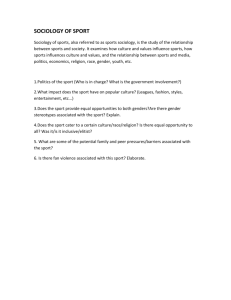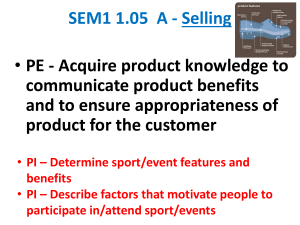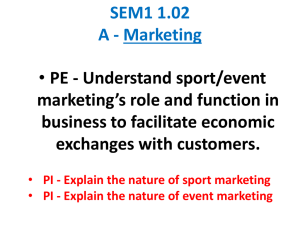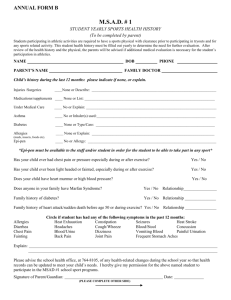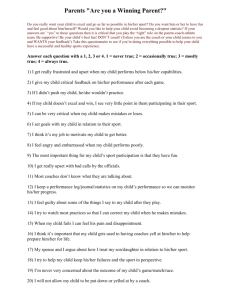MASTER OF SCIENCE (EXERCISE AND SPORTS SCIENCE
advertisement
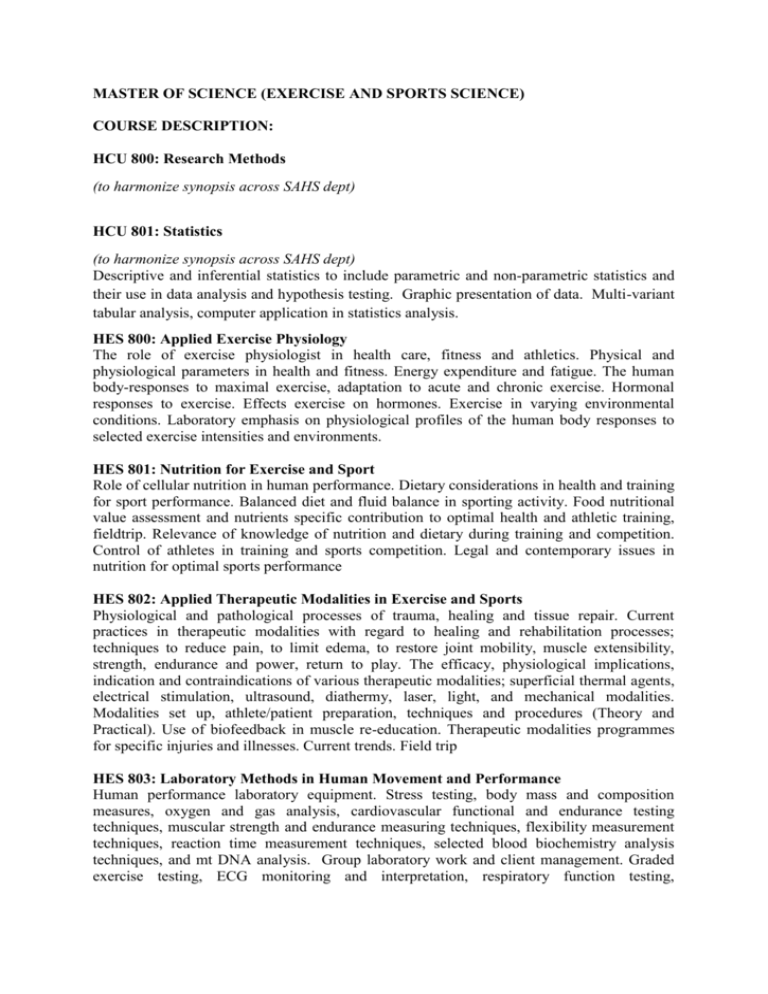
MASTER OF SCIENCE (EXERCISE AND SPORTS SCIENCE) COURSE DESCRIPTION: HCU 800: Research Methods (to harmonize synopsis across SAHS dept) HCU 801: Statistics (to harmonize synopsis across SAHS dept) Descriptive and inferential statistics to include parametric and non-parametric statistics and their use in data analysis and hypothesis testing. Graphic presentation of data. Multi-variant tabular analysis, computer application in statistics analysis. HES 800: Applied Exercise Physiology The role of exercise physiologist in health care, fitness and athletics. Physical and physiological parameters in health and fitness. Energy expenditure and fatigue. The human body-responses to maximal exercise, adaptation to acute and chronic exercise. Hormonal responses to exercise. Effects exercise on hormones. Exercise in varying environmental conditions. Laboratory emphasis on physiological profiles of the human body responses to selected exercise intensities and environments. HES 801: Nutrition for Exercise and Sport Role of cellular nutrition in human performance. Dietary considerations in health and training for sport performance. Balanced diet and fluid balance in sporting activity. Food nutritional value assessment and nutrients specific contribution to optimal health and athletic training, fieldtrip. Relevance of knowledge of nutrition and dietary during training and competition. Control of athletes in training and sports competition. Legal and contemporary issues in nutrition for optimal sports performance HES 802: Applied Therapeutic Modalities in Exercise and Sports Physiological and pathological processes of trauma, healing and tissue repair. Current practices in therapeutic modalities with regard to healing and rehabilitation processes; techniques to reduce pain, to limit edema, to restore joint mobility, muscle extensibility, strength, endurance and power, return to play. The efficacy, physiological implications, indication and contraindications of various therapeutic modalities; superficial thermal agents, electrical stimulation, ultrasound, diathermy, laser, light, and mechanical modalities. Modalities set up, athlete/patient preparation, techniques and procedures (Theory and Practical). Use of biofeedback in muscle re-education. Therapeutic modalities programmes for specific injuries and illnesses. Current trends. Field trip HES 803: Laboratory Methods in Human Movement and Performance Human performance laboratory equipment. Stress testing, body mass and composition measures, oxygen and gas analysis, cardiovascular functional and endurance testing techniques, muscular strength and endurance measuring techniques, flexibility measurement techniques, reaction time measurement techniques, selected blood biochemistry analysis techniques, and mt DNA analysis. Group laboratory work and client management. Graded exercise testing, ECG monitoring and interpretation, respiratory function testing, interpretation of test data. Legal, ethical and contemporary issues in exercise testing. Field trip. HES 804: Exercise in Chronic Diseases Exercise for people with chronic diseases for purposes of improving performance, quality of life, rehabilitation and management of these conditions as adjunct therapy. Chronic conditions included but not limited to hypertension, hypotension, bronchial/lungs diseases, liver cirrhosis, cancer, chronic kidney diseases, back pain, diabetes, obesity, ageing, ischemic heart disease, heart failure, and related cardio-myopathies, strokes, congestive obstructive pulmonary disease, adaptations in physical activities to suit people with cardiovascular diseases. Impact of these diseases on exercise performance, impact of exercise on these diseases and appropriate clinical testing procedures. Indications, contraindications and special considerations in design of exercise programs for people with these diseases, fieldtrip. Legal, ethical issues and contemporary issues in exercise chronic diseases. HES 805: Advanced Sport and Exercise Psychology Individual characteristics that affect sport participants’ behaviour, including self-perceptions, attributional patterns and perceptions of control, motivational orientations, and achievement goal perspectives in sport. Socio- environmental factors that affect sport participants’ behaviours including group dynamics in exercise and sport, social influence in sport and coaching effectiveness in the sport domain. Psychological skills and intervention techniques used for enhancing performance and modifying athletes’ behaviours, including imagery and mental rehearsal, attentional processes, goal setting, and flow and peak performance. . Fundamental goal concepts for process and performance success. Athletic injury and sport behaviour. Gender, legal, ethical and contemporary issues in psychology of sport and exercise. Field trip. HES 806: Pharmacology in Sport and Exercise Pharmacodynamics, pharmockinetics, indications, contra-indications of medications used for treatment of acute injuries and chronic diseases. Impact of these medications on blood pressure, heart rate, performance and the World Anti-doping Agency’s position stand on their legality in competitions. Possible impact of these medications on human performance through nutrient depletion in the body. Medications covered will include but not be limited to the following medications: NSAID’s, corticosteroids, anti-inflammatory agents, analgesics, hypoglycaemic agents, anti-hypertensive agents, psychotropics, anti-depressants as well as drugs for treatment of disease of the following systems: circulatory, neurological, gastrointestinal. Procedures for recording drugs in treatment. Procedures for testing banned substance use. Pharmacology legalities and liabilities. Contemporary issues in pharmacology as related to sports and exercise, fieldtrip. HES 807: Exercise and Sports in Disability An in -depth coverage of the essential issues involving athletes with disabilities including; social trends in disability sport and exercise, competitions and sport opportunities for athletes with disabilities, medical aspects for athletes with disabilities, disability sport equipment and facilities, coaching and training athletes with disabilities, event management, challenges and controversies in disability sport. Current research in disability sport and exercise, gender, legal and ethical issues in disability sport and exercise. Field trip. HES 808: Sports Performance & Ergogenic Aids Ergogenic aids in sports performance and training. Positive and negative effects of ergogenic materials should be established. The use of performance enhancement drugs, drinks and contraindications. Illicit and banned substances in sports. Enhancement of sports performance through modification of sports and athletic equipment. Sport/ exercise attire/ uniform with sports equipment. Legal and contemporary issues in ergogenic aids in sports and performance. HES 809: Prevention and Management of Athletes’ Medical Conditions Respiratory tract conditions: sinusitis, mononucleosis, bronchial and exercise-induced asthma. Gastrointestinal tract conditions: constipation, gastroenteritis, diarrhea, and hemorrhoids. Reproductive: Dermatological conditions, STDs, Hepatitis, Acquired Immunodeficiency Syndrome (AIDS). Menstrual dysfunctions. Pregnancy and sport participation. Iron-deficiency anemia. The diabetic athlete: diabetic coma, insulin shock, exercise and diabetes. Substance abuse. Eating disorders. Female Athlete Triad. Management strategies .Field work and practice with teams: analysis, assessment, and management of injuries and medical conditions. HES 810: Health and Exercise Physiology Practicum (480 hours) Candidates will undertake an internship for 480 hours (4 months). The practicum will provide valuable field experience where students will apply their theoretical knowledge gained in the classroom to real-world settings. The practicum will expand the student’s knowledge and skills through interaction with experienced professionals in a supervised workplace setting, facilitate the transition from student to professionals aiding them to clarify their career objectives. At the conclusion of the practicum, each student will need to submit a written report detailing their experience during the practicum. HES 812: Thesis This is a capstone experience in the masters degree program. Candidates will be expected, under the guidance of a supervisor(s) undertake the formally; developer concept paper, present this to during the post graduate seminar to the department, prepare and successfully defend a research proposal to the department, submit proposals two graduate school for approval, seek ethical review clearance and a research permit from the relevant authority. Collect and analyze the data, as well as present the findings at post-graduate seminar before submitting the thesis for a defense towards fulfillment of requirements for a master’s degree.


